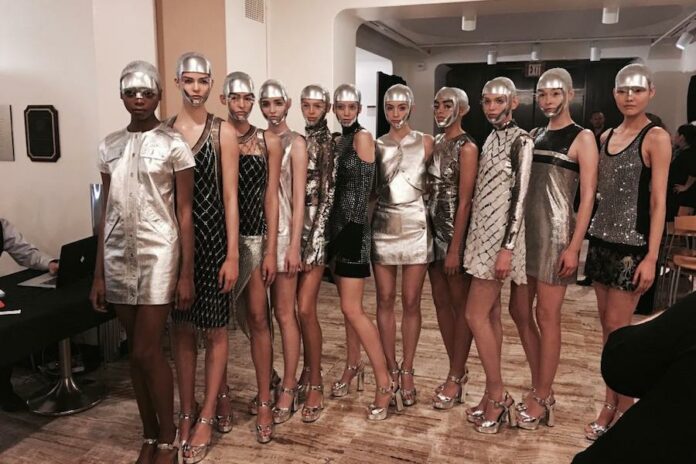Fashion Meets Technology: The Digital Evolution Of Metaverse Fashion Week 2023
Metaverse Fashion Week 2023 has showcased the latest trends in the world of digital fashion, where fashion meets digital process automation. The event was hosted entirely in the metaverse, offering a platform for designers to highlight their work and attendees to participate from anywhere in the world.
In this blog, we will explore the latest trends and innovations that were on display at Metaverse Fashion Week 2023.
Augmented Reality And Virtual Reality In Fashion:
VR and AR are rapidly changing the fashion industry by constructing new possibilities for creativity and innovation. At the forefront of this trend is the employment of AR and VR technologies to construct immersive experiences that blur the line between the real and virtual worlds.
AR and VR technologies offer designers new ways to highlight their work and engage with consumers. These digital process automation technologies construct virtual environments that permit designers to construct experiences that are impossible in the physical world. For instance, designers can construct virtual fitting rooms that permit customers to try on clothing and see how it fits without ever leaving their residences.
Virtual Fashion Shows:
One of the most exciting employment of AR and VR in the fashion industry is the ability to construct virtual fashion shows. Virtual fashion shows permit designers to construct immersive experiences that highlight their work for a global audience. These shows can be viewed from anywhere in the world, permitting designers to reach a wider audience than ever before.
Virtual fashion shows also permit designers to construct new experiences that are impossible in the physical world. For instance, designers can construct virtual environments that showcase their clothing uniquely and creatively. They can construct visual effects, animations, and even interactive elements that make the experience more engaging for viewers.
Virtual Try-Ons:
Another application of VR and AR in fashion is virtual try-on. It permits consumers to visualize how clothing looks and fits. By employing an AR app, consumers can try on clothing virtually. It permits consumers to make more informed purchasing decisions and minimizes the risk of returns.
Virtual try-on also permits greater customization. By employing 3D scanning technology, designers can construct virtual models of their clothing that are tailored to the individual measurements of each consumer. It permits them to visualize how the clothing will fit before they make a purchase.
AR And VR In Retail Stores:
VR and AR technologies are also being employed in retail stores to construct more engaging experiences for consumers. For instance, a few stores are employing AR to construct virtual mirrors that permit consumers to try on clothing virtually. This technology creates a fun and interactive experience for consumers and can also be employed to gather information on customer preferences and behavior.
Another application includes creating virtual environments that highlight clothing uniquely and creatively. This technology permits designers to create environments that match the style and aesthetic of their clothing, constructing a more cohesive and immersive experience for customers.
Sustainability In Digital Fashion:
Sustainability is becoming an increasingly mandatory concern in the fashion industry. With the rise of digital fashion, there is an opportunity to construct more sustainable and eco-friendly products.
Digital fashion refers to clothing and accessories that are designed and worn in virtual spaces employing digital technologies.
Digital fashion promotes sustainability in the following manners:
- One of the biggest perks of digital fashion is that it can significantly minimize waste in the fashion industry.
- Digital fashion also offers an opportunity to employ more eco-friendly materials. Virtual clothing and accessories can be made from materials that are sustainable or biodegradable.
- Digital fashion possesses the potential to promote a circular economy where products are designed to be repurposed, reused, or recycled.
- Virtual clothing and accessories can be easily modified and updated, permitting them to be used and reused for longer periods.
- Digital fashion minimizes the carbon footprint of the fashion industry. The production and transportation of physical clothing can have an impact on the environment.
Sustainability is a rising concern in the fashion industry, and digital fashion offers an opportunity to construct more sustainable and eco-friendly products. By minimizing waste, employing eco-friendly materials, promoting a circular economy, and lowering the carbon footprint of the fashion industry, digital fashion can help construct a more sustainable future for the industry.
As technology continues to evolve, it will be exciting to witness how designers and brands continue to incorporate sustainability into their digital fashion products and experiences.
Inclusivity And Diversity In Digital Fashion:
Inclusivity and diversity have become increasingly mandatory in the fashion industry, and this was evident at Metaverse Fashion Week 2023.
Designers featured models of distinct ages, sizes, and ethnicities, and some even created clothing specifically for individuals with disabilities. Its emphasis on inclusivity and diversity is a step towards making the fashion industry more representative of the world we live in.
The Rise Of Digital Avatars In Fashion:
Digital avatars have become prominent in the world of fashion, as they permit greater creativity and flexibility in designing and showcasing clothing.
At Metaverse Fashion Week 2023, designers will highlight their implementation of digital avatars to model their clothing and create virtual fashion shows. This Avatar trend is likely to continue as technology continues to evolve and offer new opportunities for designers to showcase their work.
Conclusion:
The implementation of VR and AR digital process automation technologies in the fashion industry is revolutionizing the way designers showcase their work and engage with international consumers. Virtual fashion shows, virtual try-on, and AR and VR in retail stores are just a few instances of the ways these technologies are being employed in the evolving fashion industry. The employment of AR and VR, sustainability, inclusivity, diversity, 3D printing, and digital avatars are just some of the trends that were on display.
We hope this guide to Metaverse Fashion Week 2023 has highlighted the latest trends and innovations digitally. As technology continues to evolve, it will be overwhelming to witness how designers continue to push the boundaries of what is possible in the world of VR and AR in fashion.

